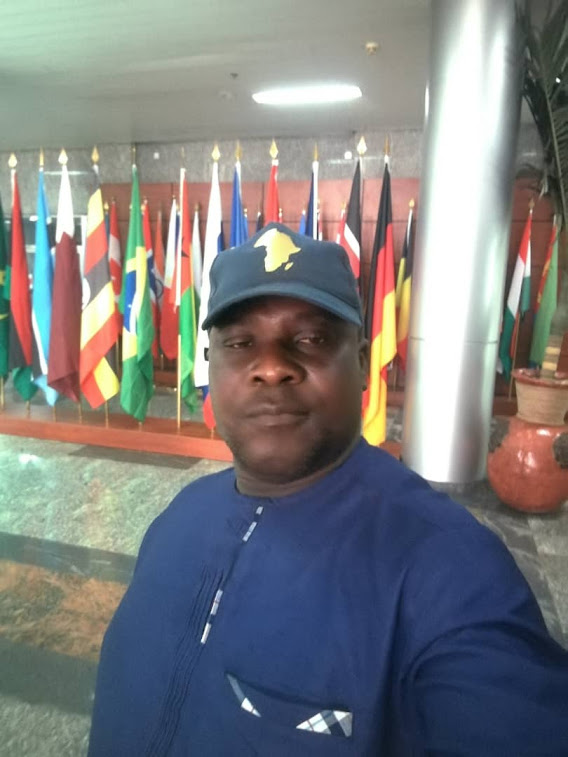‘AU ECOSOCC Nigeria is determined to achieve the union’s Agenda 2063’
Posted on: November 23, 2022, by : uguru okorieHon. Kehinde Quadri-Adu is the head of the African Union’s Economic, Social and Cultural Council (ECOSOCC) in Nigeria. The department has been actively involved in the efforts to promote Nigeria’s culture and develop it into a product to be used to sell the country’s tourism.
The crusade has taken him to different states of Nigeria where he interfaced with various government agencies and active private sector participants in culture and tourism industry.
In this interview with Africa Travel Herald, he spoke about the vision of AU ECOSOCC in Nigeria and what it has been able to achieve. Excerpts:

THE African Union, ECOSOCC, Nigeria, in the last two to three years has been very active in the culture and tourism scene. We are seeing you making inroad in the culture and tourism industry, not just in Nigeria, but in Africa. What informed this?
Agenda 2063 of the African Union (AU), when you look at Aspiration 5 of that agenda, it spoke mainly about the promotion of our cultural values and heritage. When we talk about our heritage, we are talking about our culture, and when you talk about our culture, we are talking about tourism. There is no way you can rule tourism out.
When I was appointed as Head of Culture and Tourism, Nigeria, the first thing I did was to create synergy between the Nigerian tourism stakeholders. We organized a symposium in Lagos where we invited all the commissioners of culture and tourism, because I look at it that most of these commissioners don’t know each other. A commissioner of culture in Oyo State don’t know that of Osun State. So, through that avenue, we brought them together and then we came up with a road map for 2019/2020, but because of COVID 19, we could not achieve more, but we tried our best.
Some of the things we did was that we looked at it that our youths need to be brought on board. Let us sensitize them on the business of tourism ad we hosted them in Lagos immediately after the COVID 19. They were hosted at La Campagne Resort in Lagos where we brought in notable stakeholders in the industry. We brought in some of the icons like Omotola Jolade Ekeinde, and some other people to train our youths in film making, tour guiding and so on.
Applications came in from different parts of the country and those youths are today using knowledge and the certificate the got to better their lives.
You talked about African Union’s Agenda 2063; can you tell our readers when it became active?
African leaders, our leaders, came up with the agenda 2063 as a strategic framework for socio-economic transformation of the continent over the next 50 years. We have spent first 10 years out of it.
The leaders said, let us look at Africa in the next 50 years and the Africa we want. In the next 50 years, we should be able to wear what we produce, eat what we produce and so on.
So, the area you are focusing now is the culture and tourism section of that Agenda 2063…?
Aspiration 5 of that Agenda…
You mentioned also that when you held a programme in 2019/2020, you created a road map. What is the road map all about and how have you people gone so far in actualizing the road map?
In the road map, we focused on looking at festivals in Nigeria. We looked at our fashion, Nigerian cuisines… One of the greatest things we have done is in the area of festivals.
We were able to talk to commissioners of tourism to come up with their states’ festival calendars, which most of their states submitted. We followed up by visiting some of the governors to guide them in the area of festivals’ promotion, which we have done in the north, South West, and even the east.
In the area of fashion, we have been able to promote Adire fabrics. When you see me now, I don’t wear anything apart from that. This is just to showcase to the whole world that we have something so unique in Africa.
We visited Osun State and we are one of the people that worked on Osun State Tourism Masterplan. One of the things we emphasized on, in Osun state is that Adire can be used to create more employment. That is why you see government of Osun State putting so much money on that, and not only that, they even declared a day of the week for every civil servant to and other citizens to wear Adire. I think it is every Thursday that they wear Adire. In the area of cuisines, we have partnered with notable stakeholders to promote our food. We travelled to Cross River State; we were in Imo State, and then we have been to Kebbi State, Katsina, and some other states, just to see that we promote our foods, we promote our wears. That is what Aspiration 5 of Agenda 2063 is talking about.
You’ve done so much in the area of culture and using culture to sell our tourism in Nigeria especially. There seems not to be that same push in the area eco-tourism and destination promotion.
Well, we’ve done a lot in the area of eco—tourism. One of the things we had in mind is that among blacks in the Diaspora around the world, some have identified that they are from Nigeria, majority of them being Yorubas. They want to come back home. We are not saying you should come back home and come and sit down, but come and know your origin, and we will give you a certificate of return.
We partnered with Osun State, and one of the things we want to do is that there is a place called Okinni, very close to Osogbo, we partnered with the state government to give us land…the government has allocated a land, a very beautiful environment where we planned to build an African Heritage Village.
The idea is that this people coming back home, as they are coming, let them have a key, because once you have a key, a house, an apartment, a building to yourself, you will want to come back.
So, we brought in an investor from Spain. They’ve come; they done the assessment; they’ve done everything. We are only waiting for the government for final approval. It is there, you can conform from Osun State government through the ministry of culture and tourism. All these things are there.
Then, in the last celebration of the UNWTO World Tourism Day, our focus was to promote tourism destinations. One of the things we did was that the event was celebrated, although in the Nigerian Federal Capital Territory (FCT), we moved to the hinterland. We got a commendation from the FCT authorities. We did it with zero financial input from the government. We did it and it was so successful.
Talking about heritage tourism, you mentioned your project in Osun State, however, some of the biggest attraction in the area of heritage tourism in Nigeria with extant relics of slave trade activities are in Badagry, Lagos State and Arochukwu, Abia State. Badagry has also seen a lot of tourism traffic on heritage tourism, including those going for the slave routes, what is ECOSOCC doing in that regards to see how these places can be promoted?
I told you we went to Calabar, we visited the Calabar Marina which has the slave trade museum. We are also in partnership with Institute for Tourism Professionals of Nigeria (ITPN) Lagos State chapter. Part of the things we want to do has to do with Badagry. I plan visiting there this December because before you promote a place, you have to be there and see it for yourself.
In the area of heritage, one of the things we focused on is that if we don’t take care, our languages will extinct. We are doing everything humanly possible to promote that. We are in partnership with Spanish, Cuba, Mexico, and Brazil to promote Yoruba language. Of recent, for close to two months, we’ve been participating in a programme by a European agency on culture headed by somebody from the Spanish embassy. We have been part of the discussions and online Zoom conferences, to the extent that we had a physical conference at the Brazilian embassy in Abuja. I was one of the discussants.
One of the things that we have in mind we have in mind was that, for example, the Yoruba culture. Yoruba has what in arts is called panegyrics
